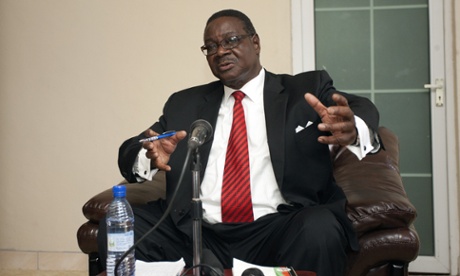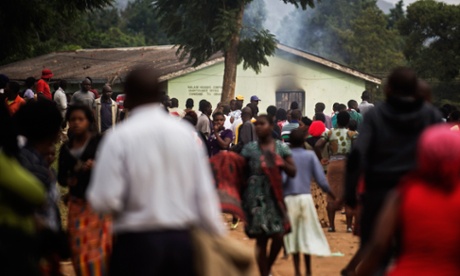
Instead, we’re trying to figure out what’s going on in a democracy that has done its level best this weekend to collapse in on itself, and take Malawi’s future with it.
The chaos began on Saturday, when President Joyce Banda – who has already rescued Malawi once before, remember, from the clutches of Bingu wa Mutharika’s budding autocracy – told the nation that she was riding to the rescue once again. Although she did not appear to have the constitutional authority to do so, she ordered the annulment of last week’s poll and scheduled a new election in 90 days’ time, insisting that the election had been so deeply flawed that she could not possibly inflict its results on the Malawian people.
So far, so stereotypical. It just so happened that Banda, with 30% of the vote counted, was trailing behind both Peter Mutharika (the late Bingu’s unexpectedly popular brother) and liberation party candidate Lazarus Chakwera. With her political future collapsing before her eyes, is anyone surprised that she would demand another chance?
This was far from a normal power grab, however. In fact, it was the opposite: Banda promised at the same time that she would not run in the new elections. “I have done this to allow that Malawians are given an opportunity to freely and fairly express their will in choosing their leaders in a free, fair, transparent and credible manner,” she said.

The answer, as far as we can make out, is somewhere in the middle.
The first thing to note is yes, the elections were flawed. Even the Malawi Electoral Commission (MEC) acknowledges this: they have ordered a manual recount, citing voter irregularities in some parts of the country. Particularly troubling were reports of votes counted significantly exceeding registered voters in some areas. Local journalist Steve Dakalira, head of news for Capital Radio Malawi, told the Daily Maverick that there was “mayhem” in several polling stations in major cities, prompting the MEC to extend voting by two days. This extension was itself an irregularity, and left the process open to potential manipulation. (Meanwhile, the African Union election observer team, in all its wisdom, commended Malawi on a “transparent electoral process”. It’s an indication of the worth of the AU’s electoral verdicts that the country’s own electoral commission has not reached the same conclusion).
The second point is that President Banda really was going to lose. The Malawi Electoral Support Network, a local observer mission, conducted a Parallel Vote Tabulation to verify the accuracy of the official results. Their figures show Peter Mutharika with 32.7%-39.3%; Lazarus Chakwera with 25.1%-31.7%; and Joyce Banda with a dismal 18.2%-21.8%.
For Banda, it’s not just that she was losing, but who she was losing toFor Banda, this is the worst possible outcome. It’s not just that she was losing, but who she was losing to. Peter Mutharika had already tried to wrestle the presidency away from her once before – when his brother Bingu died, it was Peter who led the group of ruling party members in trying to prevent the constitutional succession of Banda. Now he’s on the brink of removing her from office, legitimately this time. His success could have devastating personal implications for Banda, who has been embroiled in a multi-million dollar corruption scandal known as 'cashgate'. Should Mutharika take charge, she faces the very real prospect of prosecution and a lengthy jail term.
This, perhaps, is what Banda wants to avoid. By annulling the vote, she wasn’t trying to stay in power; rather, she would have wanted to negotiate an endorsement deal with one of the other candidates – Chakwera, most probably – she might be able to get a more friendly face in State House, and get herself off the hook. So, at least, says some of the informed speculation in Malawi.

So here’s the status quo, as far as we can make it out: Malawi’s president is unhappy with the election, and wants to annul it but can’t; the MEC is also concerned, and wants to do a recount but can’t, yet; and the likely winner of the election is perfectly happy with the outcome and already indicated that they probably won’t accept a recount, or a new vote.
“At the moment, things are calm, with the main players and their legal teams tussling with each other in court, obtaining injunctions and stay orders,” said Dakalira. Calm is good, but the legal battles could take months. It’s a stalemate; a stalemate from which an already-stagnant Malawi is unlikely to benefit.
It’s a stalemate; a stalemate from which an already-stagnant Malawi is unlikely to benefitWhatever happens, it seems that President Banda’s political career is effectively over. She was never the saint that some thought she was when she assumed office, conveniently forgetting that she was Bingu’s deputy for a reason. Nor, though, is she a wannabe president-for-life – otherwise she would never have offered to step down before new elections. She’s not fighting any more for her political future, but to save her own skin. The fact that she’s prepared to ride roughshod over Malawi’s constitution to do so is, however, an indication that the country will be better off without her.
No comments:
Post a Comment